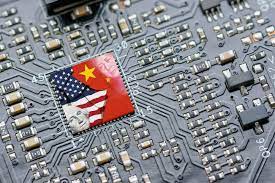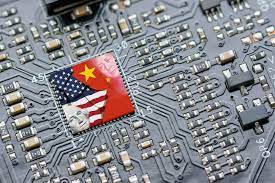
To restrain the China’s chip technology, countries like the United States and the Netherlands may continue to restrict Asian powerhouse's exports of semiconductors, according to analysts.
The Netherlands prevented ASML, a Dutch manufacturer of semiconductor equipment, from shipping certain of its deep ultraviolet lithography systems to China earlier this year. The lithography equipment that ASML supplies is essential to producing cutting-edge chips.
It happened after the United States strengthened export restrictions on sophisticated semiconductors and equipment used to make chips to China in October of last year. Beijing may exploit these cutting-edge semiconductors for military and artificial intelligence purposes, which worries Washington.
“I wouldn’t be surprised if there’s more [U.S. restrictions] coming just because we’re still in the middle of this tit-for-tat. And there’s a lot of hawks in the U.S. that are really concerned about China’s military buildup,” said Dan Hutcheson, vice chair and senior research fellow at TechInsights, on CNBC’s “Squawk Box Asia” Tuesday.
Beijing denounced the action taken by the Dutch government and called on it to "maintain an objective and fair position and market principles."
China's Ministry of Commerce stated this week that it is "highly concerned about the U.S.'s direct intervention" in the matter of high-tech exports to China by Dutch companies, and that the U.S. is using export controls as a weapon.
“It’s further evidence that not just the U.S. government, but also other Western countries like the Dutch government, are going to keep ratcheting up some of the restrictions that we’ve seen around both chipmaking equipment and also advanced semiconductors,” Chris Miller, author of “Chip War” had said in early January.
The U.S. prohibited the sale of the A800 and H800 chips, which Nvidia had produced especially for the Chinese market, in October.
The U.S. government banned the sale of advanced graphics processing units (A100 and H100 chips) to China in August 2022. As a result, Nvidia created the less powerful A800 and H800 chips.
It's difficult to imagine a significant relaxation of limitations given the approaching [US] elections and the ongoing political unrest across the Taiwan Strait. I see more tightness, if anything.
Because of this, Nvidia had to comply with US export limitations by launching even less powerful processors in China in December.
“The U.S. government has signaled that they’re planning to roll out new export controls that do close loopholes on a regular basis,” said Miller.
Customs data issued on Friday, January 12, shows that China's imports of integrated circuits fell 15.4% year over year to $349.4 billion in 2023 as a result of U.S. tariffs. The report also indicated a 10.8% fall in shipment volume.
“With [U.S.] elections impending and political tension continuing to exist in the Taiwan Strait, it’s hard to envision a meaningful pull back on restrictions. If anything, I see further tightening,” Daniel Newman, principal analyst at Futurum Research, told CNBC last week.
According to a readout on January 10, China has urged the United States to "stop arming Taiwan" and opposes Taiwan's independence.
China, the world's largest economy, is looking to its local companies to be self-reliant as a result of Western attempts to stifle its advancement in high tech.
Beijing has been forced to expand its domestic industry as a result of U.S. restrictions imposed on Chinese tech companies, including Huawei and SMIC, the country's largest chipmaker, since 2019.
According to Shanghai-based CINNO Research, the revenue of the top 10 semiconductor equipment manufacturers in China increased 39% in the first half of 2023 over the same period the previous year.
“I do think the short-term provides an advantage to the West, but China will do everything in its power to be sure it isn’t left out of the chip race,” said Futurum’s Newman.
China has historically relied on foreign companies to supply essential parts.
Beijing is no longer able to obtain some of the most cutting-edge chipmaking equipment available in the world after the Dutch government cancelled ASML's export licence.
Additionally, China is not allowed to import ASML's extreme ultraviolet lithography machines, which are necessary for businesses like Taiwan's TSMC to produce the tiniest and most advanced chips.
(Source:www.biz.crust.net)
The Netherlands prevented ASML, a Dutch manufacturer of semiconductor equipment, from shipping certain of its deep ultraviolet lithography systems to China earlier this year. The lithography equipment that ASML supplies is essential to producing cutting-edge chips.
It happened after the United States strengthened export restrictions on sophisticated semiconductors and equipment used to make chips to China in October of last year. Beijing may exploit these cutting-edge semiconductors for military and artificial intelligence purposes, which worries Washington.
“I wouldn’t be surprised if there’s more [U.S. restrictions] coming just because we’re still in the middle of this tit-for-tat. And there’s a lot of hawks in the U.S. that are really concerned about China’s military buildup,” said Dan Hutcheson, vice chair and senior research fellow at TechInsights, on CNBC’s “Squawk Box Asia” Tuesday.
Beijing denounced the action taken by the Dutch government and called on it to "maintain an objective and fair position and market principles."
China's Ministry of Commerce stated this week that it is "highly concerned about the U.S.'s direct intervention" in the matter of high-tech exports to China by Dutch companies, and that the U.S. is using export controls as a weapon.
“It’s further evidence that not just the U.S. government, but also other Western countries like the Dutch government, are going to keep ratcheting up some of the restrictions that we’ve seen around both chipmaking equipment and also advanced semiconductors,” Chris Miller, author of “Chip War” had said in early January.
The U.S. prohibited the sale of the A800 and H800 chips, which Nvidia had produced especially for the Chinese market, in October.
The U.S. government banned the sale of advanced graphics processing units (A100 and H100 chips) to China in August 2022. As a result, Nvidia created the less powerful A800 and H800 chips.
It's difficult to imagine a significant relaxation of limitations given the approaching [US] elections and the ongoing political unrest across the Taiwan Strait. I see more tightness, if anything.
Because of this, Nvidia had to comply with US export limitations by launching even less powerful processors in China in December.
“The U.S. government has signaled that they’re planning to roll out new export controls that do close loopholes on a regular basis,” said Miller.
Customs data issued on Friday, January 12, shows that China's imports of integrated circuits fell 15.4% year over year to $349.4 billion in 2023 as a result of U.S. tariffs. The report also indicated a 10.8% fall in shipment volume.
“With [U.S.] elections impending and political tension continuing to exist in the Taiwan Strait, it’s hard to envision a meaningful pull back on restrictions. If anything, I see further tightening,” Daniel Newman, principal analyst at Futurum Research, told CNBC last week.
According to a readout on January 10, China has urged the United States to "stop arming Taiwan" and opposes Taiwan's independence.
China, the world's largest economy, is looking to its local companies to be self-reliant as a result of Western attempts to stifle its advancement in high tech.
Beijing has been forced to expand its domestic industry as a result of U.S. restrictions imposed on Chinese tech companies, including Huawei and SMIC, the country's largest chipmaker, since 2019.
According to Shanghai-based CINNO Research, the revenue of the top 10 semiconductor equipment manufacturers in China increased 39% in the first half of 2023 over the same period the previous year.
“I do think the short-term provides an advantage to the West, but China will do everything in its power to be sure it isn’t left out of the chip race,” said Futurum’s Newman.
China has historically relied on foreign companies to supply essential parts.
Beijing is no longer able to obtain some of the most cutting-edge chipmaking equipment available in the world after the Dutch government cancelled ASML's export licence.
Additionally, China is not allowed to import ASML's extreme ultraviolet lithography machines, which are necessary for businesses like Taiwan's TSMC to produce the tiniest and most advanced chips.
(Source:www.biz.crust.net)





